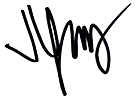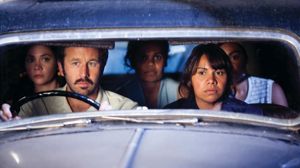The Sapphires very actively (and unsuccessfully) strives to find its place in history. And while this failure doesn't necessarily rest on your shoulders, Lisa, the prominence throughout of your archival research (expressed through a lot of grainy footage, factoids and awkward narrative impositions) is a symptom of why the movie doesn't work.
It's clear from the very start - before we even see a single frame - that the filmmakers are aspiring to be historically significant. The first thing we see is a series of titlecards. Long titlecards. Several sentences long. Which is too long. These titlecards explain that the aboriginal people of Australia were poorly treated by the government, and that one particularly egregious form of this mistreatment involved children being taken away from their families and put into residential schools. Awful stuff, yeah, and, totally relevant to something that happens later in the film--but that event is a matter tangential to the main narrative. When it occurs, all of this terrible factual stuff is clearly explained by the characters onscreen anyway.
I'm sure the sweet story at the heart of this movie is what compelled you to be a part of making it. We have these four aboriginal soul singers in late-60s Australia overcoming the odds to be part of some sort of underground USO cabaret show. Love blooms. Lessons are learned. It's contrived and maybe a bit too familiar, but this is a formula flick, a genre picture: an inspired-by-true-events musical biopic. There are rules to follow, I'm cool with that. To tell you the truth, at moments I was totally into it. The same way you can lose yourself in the gut-deep simplicity of a three-chord song. It's easy, it's expected, but that's what's pleasant about it. You guys had me. But then you lost me.
The film incessantly cuts away to archival footage or televised news reports conveniently demarcating where we are on the historical timeline. When the girls arrive in Vietnam, suddenly we're looking at black-and-white 8-mm film of actual Vietnam, which makes the already sanitized story seem even more of a flimsy Hollywood façade. And bringing in footage surrounding the assassination of Martin Luther King felt like a cheap way to impose a bit of historical gravitas.
All of the great historical stuff you dug up overwhelms everything fun and entertaining about the film. I'm not blaming you, Lisa. You had a job to do and you did it. But now that I'm thinking about it, The Sapphires suffers a bit from the aspirational issues that plagued Argo; like Ben Affleck's movie, yours breaks the fourth wall, revealing, in the end credits, photos of the real-life Sapphires, along with those American Graffiti-style where-are-they-know freeze-frame summaries. Which is nice. But introducing these people into the world of the film (the same way you introduce all of these archival bits and pieces) after the ridiculous sequence in which the Vietcong attack in the middle of performance, complete with an Alfonso Cuaron-like tracking shot and blown-up bodies flying through the frame like it's a deleted scene from Olympus Has Fallen.
It's a shame, because there were some pretty terrific moments. More genuine laughs than I expected. But also just as many diversions into awkward docudrama history lessons. And sometimes, utterly erroneous. I guarantee that there were no white soldiers in Vietnam so racists that they'd refuse to let a black doctor address their wounds. You probably knew that, too and should have let the screenwriter know. It's a small detail, but in a movie that aspires to historical profundity, little details like that matter.
Sincerely,

Jared







